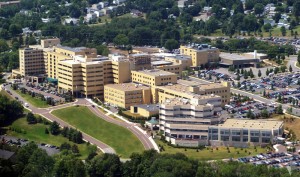Key gas drilling health study collecting data in Pennsylvania
From an Article by Kevin Begos, Associated Press, December 31, 2013
PITTSBURGH – Almost two years after it began, a much-publicized plan to study possible health impacts from gas drilling is still in the process of collecting data.
Geisinger Health Systems, of Danville, began seeking partners for the long-term project in early 2012. It’s secured at least $1.3 million in funding and has attracted a wide range of medical, environmental and academic partners. For now, the main goal is to build a data warehouse available to researchers.
Geisinger spokeswoman Patti Urosevich said in an email that the project collected Pennsylvania data on traffic and accidents, air pollution emissions and the locations of thousands of gas wells and more than 600 compressor stations, which feed the gas through pipelines.
Urosevich wrote that once the data warehouse is complete, researchers will be able to identify and investigate trends by merging health information with data such as geography, traffic, or the environment.
Guthrie Health, of Sayre, and Susquehanna Health are other major partners in the study, and as a group they have access to detailed health histories of hundreds of thousands of patients who live near wells and other facilities that are producing natural gas from the underground Marcellus Shale formation.
The Marcellus lies under large parts of Pennsylvania, West Virginia, Ohio and New York. While the boom in drilling has generated jobs and billions of dollars in revenue for companies and individual leaseholders, it also raised health concerns.
One public health expert welcomed the Geisinger work but said a bigger problem remains: the state of Pennsylvania isn’t doing enough to fund even basic research into possible health impacts of gas drilling.
It’s the state’s responsibility to collect public health data, said Bernard Goldstein, a professor emeritus at the University of Pittsburgh School of Public Health who is not part of the Geisinger project.
Goldstein noted that a state commission suggested two years ago that the Department of Health be given $2 million to create a statewide health registry to track illnesses potentially related to gas drilling. But representatives from Gov. Tom Corbett’s office and the state Senate cut the funding.
Alan Krupnick, an energy and risk management expert who’s on the Geisinger project executive committee, wrote in an email that health care providers “are sitting on a treasure trove of health data” that could be compared to shale gas development “to find out if and the extent to which these activities are affecting health.”
Krupnick is a researcher at Resources for the Future, a nonpartisan Washington, D.C. think tank.
In early December, the Geisinger project was awarded a $250,000 grant from the U.S. Geological Survey to survey and test 72 private water wells in Lycoming County, which has seen heavy drilling activity. Urosevich said that work should provide insights “into the possible effects of natural gas drilling, agriculture, leaking septic systems and industries on the groundwater.”
Geisinger researchers say they plan to study rates of asthma, premature births, and motor vehicle injuries in areas with heavy drilling activity, but there’s no specific schedule for publishing.
In a recent newsletter that discussed the project, lead researcher David Carey said timing is critical. “If we wait too long, it will be hard to get baseline data,” Carey said, adding that they need to move toward “doing some analysis.”


{ 4 comments… read them below or add one }
Texas firm to pay $275,000 for illegal Shale workers
Posted: Associated Press, January 4, 2014
HARRISBURG, Pa. (AP) – A Texas company doing survey work on the Marcellus Shale will forfeit $250,000 after admitting it illegally transported and housed 19 foreign workers.
The Williamsport Sun-Gazette reports that GPX/GPX USA pleaded guilty Friday to using illegal laborers from Mexico to help with oil and gas mapping surveys of the Marcellus Shale.
The Sealey, Texas, company has agreed to forfeit $250,000 and pay more than $25,000 in fines after its plea Friday. The formal sentencing is set for Thursday in federal court in Harrisburg.
Lawyer Steve Britt of Blue Bell says Saturday that company owner Michael Ellis runs a small business that didn’t properly check the workers’ backgrounds. A foreman has pleaded guilty to a misdemeanor.
The May 2012 indictment says the workers lived at three Williamsport apartments.
SkyTruth Report Details: NRC Report ID: 1070045
Incident Time: 2014-01-03 21:30:00
Nearest City: Washington, PA
Location: CRYOGENIC PROCESSING FACILITY ON
TOP OF HILL IN AN AGRICULTURAL AREA,
800 WESTERN AVE, Houston, PA
Material: PROPANE. Medium Affected: AIR
Suspected Responsible Party: MARK WEST
SkyTruth Analysis: Report Description
***WEB REPORT*** A VERY HEAVY DISTINCT ODOR OF PROPANE IN THE AIR.
SKYTRUTH Report Details: NRC Report ID: 1070255
Incident Time: 2014-01-06 18:00:00
Nearest City: Houston, PA
Location: WESTERN AVE, HOUSTON, PA
Material: BLACK CARBON SMOKE, Medium Affected: AIR
Suspected Responsible Party: MARK WEST LIBERTY
SkyTruth Analysis: Report Description
CALLER STATED THERE IS A GAS PLANT THAT HAS A HUGE FLARE THAT IS GOING OFF AND IS RELEASING CARBON BLACK SMOKE.
One public health expert welcomed the Geisinger work but said a bigger problem remains: the state of Pennsylvania isn’t doing enough to fund even basic research into possible health impacts of gas drilling . . .
****
This is not the nightmare for PA – it is we are not investing in fixing the 40 to 60% of private wells that produce water, that is not drinkable, that has nothing to do with oil and gas development. This is the real health crisis.